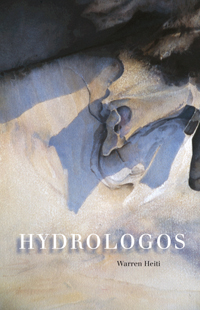Reviews
Poetry Review by Eric Miller
Warren Heiti, Hydrologos (Toronto: Pedlar, 2011). Paperbound, 109 pp., $20.
 Edmund Burke once claimed that the first emotion of the human mind
is curiosity. Those who agree with Burke’s sense of things, when
angry, may denounce incuriosity in the literary sphere as “Philistinism”;
or, more sadly and more accurately, regret it as the defect of a
destructive—ultimately, self-destructive—impatience. Even tolerance
can be a suave variant of incuriosity, to the degree that it refuses to
experience the strange as strange. So allusive is Warren Heiti’s first
book, Hydrologos, that it knowingly risks the hostility of the incurious,
while implicitly petitioning or expecting a certain valour on the part of
its reader. But that reader should consent to descend in the sometimes
playful, sometimes harrowing company of this Orphic and Hermetic
poet, into the sundry delights and depths of allusion as a power.
Edmund Burke once claimed that the first emotion of the human mind
is curiosity. Those who agree with Burke’s sense of things, when
angry, may denounce incuriosity in the literary sphere as “Philistinism”;
or, more sadly and more accurately, regret it as the defect of a
destructive—ultimately, self-destructive—impatience. Even tolerance
can be a suave variant of incuriosity, to the degree that it refuses to
experience the strange as strange. So allusive is Warren Heiti’s first
book, Hydrologos, that it knowingly risks the hostility of the incurious,
while implicitly petitioning or expecting a certain valour on the part of
its reader. But that reader should consent to descend in the sometimes
playful, sometimes harrowing company of this Orphic and Hermetic
poet, into the sundry delights and depths of allusion as a power.
Allusion in Heiti is not simple, but maximally variable. He does practise sustained allusion—to Ondaatje, to Virgil, to Lorca, to the manifold myth of Orpheus and Eurydice. But to “identify” an allusion, to seek to identify an allusion, is a meagre, even impoverishing, way to read. Heiti goes halfway toward satisfying that lesser hunger, by providing a circumstantial “Cast of Characters” at the end of his book (a choice that, also allusive, aligns him with writers such as Robert Bringhurst, Iain Higgins, and Anne Carson). Yet allusion is really rather like Heiti’s Eurydice, definitively lost when too possessively sought. The best passages of Heiti’s book live vividly in the inter-space between the parties to an allusion; love and intelligence, precarious forces, bind them together—fear and unreason contrive to pull them apart.
Here is an instance to prove this poet’s strength, with a smaller
measure of testimony to his characteristic weaknesses. These weaknesses,
however, are interpretable as possible manifestations of his
future growth.
This cactus, dry and cranky
As the mind of Herakleitos,
A many-tentacled tidal wave
Arrested mid-crash and still
Crashing, the gnarled arthritic
Rivers of time, photographed
From eternity. The soul,
Pale as cactus sap, tries
To stand upright, a column
Of light, but gravity,
Gorgon-haired, lizard-skinned,
Shaper of parabolas, harmony’s
Architect, turns it back
To the tonic of its roots.
No: not the Rossetti wrist
Of the violinist, but a bouquet
Of crossbows, a weeping
Tree of scorpion tails;
Analysis, arson’s logic,
Styled with mortality;
The fever-struck body, seizuring
Arch-backed on the hard bunk.
It is one form, one kind
Of wisdom, disciplined by fire.
(“Euphorbia lacteal, Allan Gardens”)
The opening lines adducing Herakleitos not only assume, but demonstrate the unity of scientific neo-classicism with archaic philosophy. Dante Gabriel Rossetti’s appearance invokes the Pre-Raphaelite Brother hood’s sometimes idealized painstaking in representing things: to idealize is often a form or a forerunner of sadism. Heiti’s poem instead addresses pain from the start, plainly. The focus of the verse on a specimen object recalls the procedures of Rilke. As for the Euphorbia, it may weep a continuous stream of milky sap, yet it fronts the world (as Heiti eloquently shows) with effective spines. The poet’s versatility in tightly compacting so many vivid images, sounds, and suggestive connotations serves his “gnarled” and scorpion-armed subject well. Weaknesses must be conceded. The closing sentence is peculiarly mild and, striving to summarize, obfuscates the ferocity of the poem on which it seeks to impose an end. The density of juxtaposed, implied imagery (we have a cranky mind; a squid; a tidal wave; afflicted joints; streams; and on, and on) works tremendously, when it does work. The description of the soul’s resistance to gravity, vigorously figured in the monstrous shape that the cactus assumes, could hardly be bettered. That is the essence of Heiti’s problem. How surpass yourself, when your style depends so much on amassing numerous, revelatory similitudes?
The tensely tormented Euphorbia could be promoted to representative status, the emblem of Heiti’s sizeable talent. For all its vegetable stasis, the plant writhes in his strong verses with a really Hellenistic violence, like the figure of Laocoön. Analogously, I seem to see at the heart of Heiti’s book his tutelary genius writhing, now and then, with a degree of violence that its occasions do not quite merit. The violence derives from both a satisfying plenitude and a doubtful surfeit of energy. Fortunately, this is the energy of growth. Heiti gestures toward two distinct domains—toward what the poet wishes to be, and toward what he will become. Neither set of gestures should be discouraged. In Hydrologos, Heiti allows many such gestures sufficient room to discover plausibly the span of their aspiration. Sometimes— to change the image—he mars his own sketch, by the flurry and superfluity of occluding strokes.
—Eric Miller









